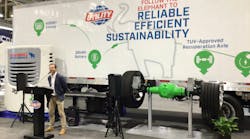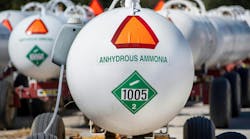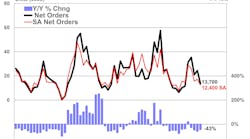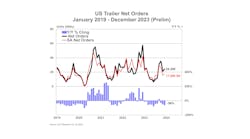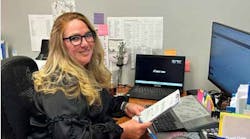DON Reynolds, a consulting economist and professional speaker who calls himself “The Paranoid Optimist,” warned a year ago that inflation was coming back.
He's even more serious this year.
Reynolds said that when he looks at the components of today's marketplace, he goes right to Federal Reserve chairman Ben Bernanke, who is known by his critics as “Helicopter Ben” because he once favorably cited Milton Friedman's “helicopter drop” — the figurative notion of handing out cash to the public to restore the economy.
“Here's Ben: ‘The number one job of the Federal Reserve Board is to secure inflation and the number two job is to stimulate employment,’” Reynolds said. “So what Ben Bernanke has done as we've gone through this crisis is basically put an extra $2 trillion worth of liquidity into the economy. You have low interest rates and $2 trillion extra worth of liquidity. Corporate profits are going through the roof. Massive amounts of liquidity are sitting out there. This is a pretty good prescription so far.
“And he is looking at it and he's thinking, ‘My number one job is to stop inflation, and the only way is to take the extra trillion dollars of liquidity and send it out of the economy.’ And the way he does that is to raise interest rates. Uh-oh. If we are in the process of recovering and we raise interest rates, is that a good thing? No, it's not, and that is Bernanke's dilemma. He knows he has to withdraw the excess liquidity or we will see more inflation. But if he does withdraw the liquidity, he risks the chance of slowing down the economy.
“And the consensus is he's going to err in favor of inflation. I never thought I would hear a Central Bank economist say, ‘A little inflation would be good for the country.’ That's like a little pregnancy. Once it gets started, it's not so easy to stop. If he makes the wrong policy decision, it will produce a negative scenario that we won't like.
“I think he may let some inflation come back in: ‘A little inflation might be helpful. We're going to try to get some inflation in this system to help the economy grow.’ I will tell you that 2% inflation is tolerable. The problem is, we're probably looking at 4.5% inflation for the next year.”
Reynolds said he is forecasting a 4% increase in real economic growth in the US this year — about 1.5% higher than the forecast before the Bush tax cuts were extended.
“It could be 4%, it could be 3.5%, but that is real solid, fundamental growth,” he said. “There is $8 trillion of excess liquidity sitting around, waiting to find a place. No one wants to put money into bonds if interest rates are going to go up. Corporations have $2 trillion by themselves, and individuals another $6 trillion. Where is it going to go? Earnings are good. If you have great earnings and great liquidity, that's sort of like having tinder wood and gasoline. You're going to have growth.
“My thought about the stock market is that it's possible we could see a melt-up, not a meltdown. You could see it pick up 500 or 600 points in a matter of a few days. I think the market has that type of ability behind it. In addition to an earnings outlook, we still have interest rates relatively low and a very favorable environment, and all this starts to add together. As long as you have earnings, you have economic growth.”
He said he is “personally 100% fully invested” in the stock market, preferring anything “unique to Asia.”
“The global economy is coming back and the banks should be coming back, so I might like the financial securities industry,” he said. “This market is going to be led by the big guys, the large-cap names. I've been extremely aggressive with banks and financial-services firms. Listen folks, if you think this market's going to go to 14,000 — and I certainly do — you don't have to have the fastest horse to make money. You just have to have a good horse.
“When one oil company does well, all the oil companies will do well. When one of you does well, almost all of you are doing well. We all respond to similar set of industry trends. And so when you take a look at it, you say, ‘This is going to continue moving onward.’
“From 1950 to 1966, the stock market goes straight up. Then the stock market pulls sideways from 1966 to 1982. Ronald Reagan takes office. From 1982 to 2000, the stock market goes right back up. And now we are in a new trading range. We have bounced around a couple of times. Now we are going back to 14,000.
“If you have a 401k, here are my current allocations: 40% international, 30% large cap, 10% small cap, a little real estate, a little energy and natural resources. The couch potato's would be: 20% large cap, 20% small cap, 20% international, 20% middle, and split up between real estate and natural resources. The newest emerging markets are now no longer called emerging markets. They are called frontier markets. Africa is the emerging frontier market. Watch out: It is the next story.
“I own gold. Four or five percent of every one of my portfolios has some gold and silver. I tell people that it is just as easy to take delivery in gold and silver coins. If inflation gets crazy and the world gets crazy, gold is a good insurance policy.”
He said that in a presidential cycle, the stock market averages a 5% gain in the first year, followed by 6%, 17%, and 6%. The second year of Obama's reign produced a 5.5% gain, and Reynolds said he believes the market looks very capable of a 17% gain in the third year.
“If you get a 17% market rise in the current year, we are back to 14,000,” he said.
Other thoughts:
- Real estate.
“Another 2.5 million foreclosures are coming. Housing is a long way from full recovery. I think you will see a long plateau effect. And if you exclude housing from the economy, all the major sectors are beginning to react well.
“I like commercial real estate. The problem is that buildings are still selling below replacement costs. But there's still some money to be made. Commercial real estate is going to come back faster than residential.
“The demographics are all against the housing markets because of the Baby Boomers. They want to retire to smaller houses, not bigger.”
- US dollar.
“The US enjoys an enormous advantage because it's what we call the world's reserve currency. We have 5 trillion of our dollars floating around. At some point, other countries will not want them. In 2000, the US controlled 22% of the global economy. In 2030, the US will control 12%. It's not that our economy is shrinking. It's just that the global economy is going that much faster. I'm not looking for great things out of the dollar. There's no reason to because we have a debt problem.”
